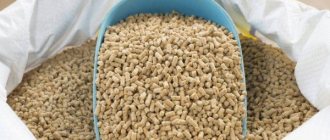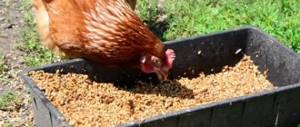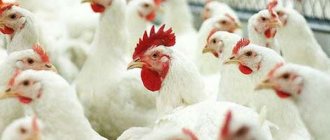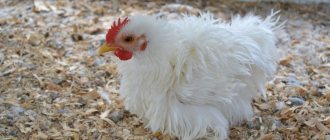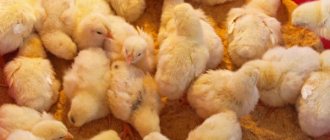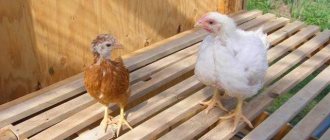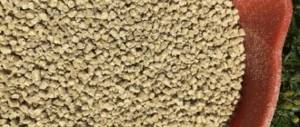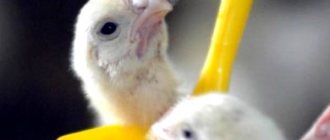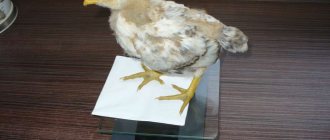Poultry farming » Chickens
0
4369
Article rating
Kira Stoletova
Vitamins for chickens are the main component of their diet, because the health of broilers depends on them. Every owner who decides to get a similar bird should know about this.
Vitamins for broiler chickens
Vitamins for young chickens play a very important role in the first days of life. The further growth and health of the bird depends on them. Let's figure out what vitamins need to be given to broilers.
Vitamins for broiler chickens
Raising broiler chickens is a good business today, so to get quality meat, you need to have healthy birds, and for this you need to ensure that broilers are well fed.
Proper nutrition and feeding depends on vitamins, which must be given as an additive to the food. Supplements can speed up the growth of poultry, but they must be given strictly according to the schedule proposed by the manufacturer. There is also a special table that states what and how many vitamins a chicken should receive.
| Number of vitamins | Unit | Broilers | Pullets | Laying hens | Tribal | |
| In kg of complex | Start | Finish | ||||
| A | ME | 500000 | 50000000 | 45000000 | 40000000 | 50000000 |
| D3 | ME | 15000000 | 10000000 | 10000000 | 12500000 | 10000000 |
| E | mg | 150000 | 150000 | 100000 | 100000 | 200000 |
| K3 | mg | 10000 | 10000 | 7500 | 5000 | 10000 |
| IN 1 | mg | 10000 | 10000 | 7500 | 5000 | 10000 |
| AT 2 | mg | 35000 | 30000 | 25000 | 25000 | 40000 |
| RR/B3 | mg | 200000 | 150000 | 125000 | 100000 | 150000 |
| Pantotheca acid (B5) | mg | 60000 | 50000 | 40000 | 40000 | 60000 |
| AT 6 | mg | 20000 | 15000 | 15000 | 15000 | 20000 |
| Folieva company | mg | 5000 | 2500 | 3500 | 2500 | 5000 |
| Biotin | mg | 500 | 250 | 300 | 400 | 1000 |
| AT 12 | mg | 100 | 100 | 100 | 75 | 100 |
It allows you to develop a clear feeding plan at home. It is best to print out a table for yourself with the names and dosage, and hang it so that it is always in front of your eyes. Then you will definitely not make mistakes.
When the chickens are 5 days old, it is necessary to feed them with vitamins A and E. There is a special scheme for feeding vitamins A and E:
- on the 5th day, give 1 drop per 2 broilers;
- on days 7-9 you need to give 1 drop to 2 chickens;
- on days 10-15, give 2 drops per bird;
- 16-35 days - 4 drops per chicken;
- 35-45 days - 5 drops per chick.
This dosage for broilers in the first days of life allows them to develop normally from birth. You should not experiment and give more or less, otherwise such additives may negatively affect the health of the bird.
Vitamins for chickens can be added not only to feed, but also to water. There are special soluble preparations for this. There are also additives in the form of drops; they are much easier to give along with water than to feed the chicks with a pipette.
Medical kit for broiler chickens
Medicines intended for emergency use should not be taken in vain. This is especially true for antibiotics.
Indiscriminate use of dosage forms leads to addiction, one’s own immunity is impaired, and the gastrointestinal tract refuses to function.
Baytril
All antibiotics are used in accordance with the instructions for use for broiler chickens, Baytril too.
The drug Baytril is sold in the form of a 10% yellowish solution. Microbes are destroyed by the active substance – enrofloxacin.
The drug acts on gram-negative and gram-positive microbes. Such diseases include:
- colibacillosis;
- enteritis;
- mycoplasmosis.
Used in quantity: 50 ml of the drug diluted in 100 liters of water. For small livestock – 5 drops per liter of water. After three weeks, if the disease becomes chronic, the dose is doubled.
Instructions for the use of Baytril for broiler chickens prescribe drinking water with an antibiotic for 3 days, after a week's break, the next 5 should be given vitamin complexes to restore the intestinal microflora.
The drug is effective for mixed type infections, salmonellosis, but is not used for streptococci, as it is not effective.
You cannot use simultaneously:
- microlides;
- tetracycline;
- chloramphenicol;
- Marek's vaccine.
The drug must be stored and used in strict accordance with the instructions.
Dietrim
The dual formulation includes 4% trimethaprine and 20% sulfademisine. In farmsteads, this low-toxic drug is used to treat coxidia and eimeriosis in broiler chickens. The two components act alternately, mutually reinforcing each other. For broilers, the drug is used for soldering and intramuscular injections. In this case, no inflammation occurs at the injection site, and decay products are eliminated within 24 hours.
Advantages of the drug Ditrim:
- effective treatment;
- pathogens do not produce resistant strains and can be used for preventive purposes;
- low toxicity, belongs to hazard group 4.
Calcium borgluconate
The drug is used at the first signs of vitamin deficiency. When broilers fall on their feet without accompanying signs - curd discharge from the eyes, dirty feathers. Calcium borgluconate for broilers is a complex preparation, sterile, for subcutaneous injection. Contents in 1 liter:
- calcium gluconate – 200 g;
- boric acid – 18.5 g;
- complex salt of tetraborate 10 aqueous – 13 g.
The drug does not have an irritating effect when administered subcutaneously. Its administration stimulates metabolism, has an anti-inflammatory effect and makes the heart muscle work better.
Tromexin
The drug in powder is dissolved in water at a dilution rate for the first day of treatment of 2 g per 1 liter of water. On days 2 and 3, the concentration is reduced by 2 times. If the symptoms of the disease do not go away, drinking continues for another 2 days.
The drug Tromexin is used for infectious diarrhea:
- bacterial enteritis;
- colibacillosis;
- salmonellosis.
If the dosage is observed, there are no side effects. You must follow the instructions exactly.
Amprolium
Narrow-acting drug. It is used to treat and prevent coccidiosis in broiler chickens and young chickens. The medicine is a water-soluble complex powder containing 30% active ingredient and 70% lactose. The active ingredient amprolium remains effective for 5 years if stored correctly. The medicinal substance is used as an additive to dry food. The powder destroys coccidia parasites by replacing the closely related vitamin B1, thereby disrupting the carbohydrate balance. The mucous cells of the avian gastrointestinal tract do not allow the active substance to enter, and it is excreted from the body in feces.
For chickens, the powder is added to the feed or water according to the instructions.
Metronidazole
The drug is available in powder or tablet form. The active substance is highly soluble in water. For feeding chickens, it is better to purchase a powder form. Metronidazole has no side effects, but effectively destroys the infection - Trichomonella. The drug is recommended to be used for the prevention of trichomoniasis.
Baycox
The drug is indispensable for the prevention and treatment of all forms of coccidiosis. The active substance tetrazuril acts selectively on pathogens at all stages of development, even during the intracellular period. The composition is added to drink and food, even together with vitamin preparations. Use Baikos according to the instructions for use for broilers, together with other complexes of drugs, as prescribed by a veterinarian. It is prescribed when the level of coccidia in the litter is 10-20 thousand/g.
For drinking, use 1 ml of 2.5% Baikos solution per 1 liter of water. The solution can be used within 2 days.
After 48 hours, a fresh solution is prepared. If the improvements are insignificant, treatment can be repeated after 5 days.
Trisulfone
The drug is used to treat coccidiosis. Ingestion of the drug slows down the metabolism in the body, the production of nucleic acids is blocked, and microbes die. Diseases are cured:
- pasteurellosis;
- coccidiosis;
- colibacillosis;
- salmonellosis.
Trisulfone is used to add to drinks. Dilute 200 g of powder per 100 liters of water or 1 ml of suspension per 1 liter of water.
Vitamin preparations
With a lack of vitamins when feeding broilers, non-infectious diseases begin, expressed in various external signs. Therefore, the use of tetrahydrovit and trivitamin P for preventive and therapeutic purposes is mandatory. The composition contains the most important vitamins for the development of chickens - A, D, E.
Vitamin A increases the body's resistance to external factors. Vitamin D is required for good calcium absorption. E – improves vision. Trivitamin P is added to feed, as it is absorbed in an oily environment.
Tetrahydrovit is used to treat vitamin deficiency and additionally contains vitamin C. For boilers, vitamins are added to the drinking bowls when there is a lag in weight gain. Take the drug with a balanced diet, under the supervision of a veterinarian.
The listed medicinal substances should always be in the first aid kit, but you should not abuse them.
What food additives should be introduced into the diet of chickens?
Nutritional supplements are an integral part of chick nutrition. These include various vegetables, fruits and vitamins in their pure form. What can be introduced into the diet of chickens?
The cheapest and healthiest vegetable is carrots. The vegetable contains many useful substances. The grated root vegetable must be mixed with pre-steamed hay. It is better to feed spring broiler birds with fresh grass.
Experienced farmers also give chickens trivit, baikon, glucose and chiktonik in the first days of life. This is a mixture added to the feed 2 times a week for broilers that are only a day old. It is better to make such a substance as a medicine at home. You need to take 200 ml of vegetable oil and add 1 tsp there. vitamins D2, A and E. It is better to keep the mixture in the refrigerator or in a dark, cool place, but it is better to put it somewhere where the child will not find it.
If you feed broilers with the additive regularly, this will be a good prevention against various diseases.
It is advantageous to replace this mixture with a drug such as multivitamin acidos. It contains the same amount of vitamins and minerals as a homemade solution.
From the fifth day you need to introduce mineral supplements into your diet. You can buy them at a veterinary pharmacy or use ordinary chalk. The bird should receive 3 g of the mixture per day; it is better to give the chicks a chalk supplement from the first days.
Vitamins for chickens from the first days of life
In such situations, salvation is seen in purchased drugs. Here are the most reliable ones:
1. Aminovital vitamins for chickens. This is a product that combines a trio of amino acids, eight vitamins and minerals. The drug is intended for all age groups of young animals. It is added to water. When determining the dosage, it is important to adhere to the manufacturer’s recommendations prescribed in the instructions.
2. Mixovit vitamins for chickens. This drug can be given to birds of all ages and technological groups. One of the advantages of Miksovit is its rich vitamin composition. When rationing, the age and live weight of birds are taken into account.
3. Immunovital vitamins for chickens. This is a universal product - also relevant in poultry farming, cattle breeding, and fur farming. Positive effects: revives weakened immunity, promotes muscle tissue gain, and has a general strengthening effect. Can be used as a preventative or therapeutic agent. It is usually added to water at the rate of 2.5 ml/1 l of H2O.
4. Prodevit – complex vitamin concentrate. Dosages: sexually mature individuals – 3 drops per 10 heads, young animals – 1.5 drops per 10 yellow-throated babies.
Fans of folk remedies should pay attention to the so-called “Trivitamin”, which includes retinol, tocopherol, D2 or D3. These are fat-soluble biologically active substances. Therefore, a reasonable solution would be to supplement the product with vegetable oil (1 tbsp.). After thoroughly mixing the ingredients, the drug matures in a cool, dark place.
A prophylactic solution for young animals is prepared very simply: feed mixture (10 kg) + drug (10 tsp). If you periodically feed food enriched with vitamins, you can forget about ailments that affect joints and bone tissue. The drug begins to be given to birds at the age of +7 weeks.
How to calculate feeding correctly
Before you buy any food, you need to study its composition in order to know what other vitamins need to be included in the diet. Moreover, those substances that are needed for day-old chicks are not always suitable for month-old chickens.
There are also those beneficial substances that must be included in feed, one of which is coccidiostatic. It helps prevent diseases such as coccidiosis. This is a disease that causes internal bleeding in chickens, so the bird should receive this substance from the first day of life as a preventive measure against such a complex disease.
There are foods that contain all the beneficial microelements. When purchasing, you just need to tell the seller that you need food for laying hens or broilers, and their age.
Restarter feed, which contains all the necessary vitamins for chickens, is popular. It is great for birds of any age. Restarter Feed contains all the beneficial elements that birds need for normal growth and weight gain. It is given until the chick is 1 month old. If this is not possible, then it is advisable to feed them for at least a few weeks.
What role do vitamins play for chickens?
It is important that in the first days of life the chicks receive a balanced diet rich in vitamins. After all, nutritious feed is the basis for normal development, excellent health, and, in the future, high productivity of laying hens.
Vitamins are involved in biochemical processes that ensure the vital functions of the avian body. Without them, it is impossible to imagine the growth, functioning and constant regeneration of organs and systems. A number of vitamins (B, D) are independently synthesized by the body. They are responsible for normal metabolism, proper functioning of organs and the immune system.
True, the bird’s body receives a huge amount of vitamins from food. If they are not in the feed, the chicks will begin to get sick, be stunted, and gain weight poorly.
Control of vitamins in broiler diets
In order for raising broilers to generate income, you need to approach the issue of feeding correctly. The food must be saturated with all useful elements. Vitamins for chickens should be sufficient for their age. Feeding must be carried out according to a clear pattern so as not to cause vitamin deficiency or hypovitaminosis.
Vitamins for chickens in the first days of life should be added only to crushed food. It is better to use ground oatmeal or wheat for this. If desired, it is allowed to add useful substances to the water.
Vitamins for broiler chickens that are 3 days old must be given with fresh feed. But this must be done gradually. Greens must be cut into as small pieces as possible and mixed with dry food.
Fish contains many useful elements, so it is recommended to buy fishmeal and give it a little at a time. Until the chicken is one month old, the daily norm should be 5 g. After a month, the chick should receive 12 g per day. It is also advisable to introduce fermented milk products into the diet.
After the broilers are one month old, the fourth part of the menu should include potatoes. This bird loves it very much and eats it with pleasure. Another favorite vegetable for chickens is daikon, but you shouldn’t feed it too much.
Natural vitamin supplements
without additives of wet and green food.
For month-old chicks, the diet expands, because their immunity is already strengthened. On the fifth day, vitamins A, D and E are introduced into the broiler diet; they are sold in pharmacies. They are dripped in a certain dose into each chick’s beak. To avoid errors, the procedure is carried out according to the following scheme:
- Day 5-6 – 1 drop per 2 heads;
- Days 7-9 – 1 drop per individual;
- 16-35 days – 4 drops per individual;
- Day 35-45 – 5 drops per individual.
Feeding chickens individual;
Soluble vitamins are part of special complex preparations - “Trivit”, “Chiktonik”, “Baikon”, “Solnyshko”, “Aminovital”, “Polivitaminacidos”, etc. The order of administration and dosage are individual, before use it is better to consult a veterinarian. Good ways to provide birds with vitamins include the use of premixes to strengthen immunity and growth, these are purchased according to the age and weight of the birds in the brood. Only specialists take
Antibiotic-free regimen
are suitable, they contain a different set of components.
Useful minerals necessary for the development of the bird's body are also found in ordinary foods. From about the 5th day of life, the chicks are given crushed chalk, shells, fine gravel and bone meal. Similar ingredients are used at a rate of 2-3 g per head, this is the daily requirement of calcium for chicks.
What to do if there are not enough vitamins in your diet
There should be enough vitamins in the diet of chickens, but if they are not enough, this negatively affects the growth and health of the bird. The lack of nutrients can be determined by the appearance of the chick. He's not gaining weight well and looks kind of lethargic.
If deviations appear, then you do not need to treat the bird yourself at home. Call a veterinarian, he will examine the animal and tell you what the problem is. Maybe the wrong diet was chosen for the chicken; the doctor will tell you what needs to be added to the diet. But it may also be that the reason for this condition of the broiler is some kind of serious disease.
Vitamin deficiency can be determined by the appearance of the bird. It is necessary to examine the joints; if they have become larger in size, then this is the first sign of arthritis. This disease only occurs if the chicken is not eating properly. This may also indicate that there is not enough vitamin D in the diet. If the sun provides this component in the summer, then in winter it needs to be added to the water.
Vitamins A and D must be included in the diet. The bird needs this for normal growth and to prevent various diseases. So if you raise broilers in the winter, it is better to stock up on these vitamins in advance. They need to be given from the first day of life.
What vitamins should I give to broiler chickens?
So, let's move on to considering the sources of vitamins used by broiler breeders.
Oil solutions.
Such products are obtained by heating oil in which vitamins, minerals and medications are dissolved.
Fish fat
It is a storehouse of retinol, cholecalciferol, healthy fatty and organic acids.
This popular supplement has a positive effect on the condition of the organs of vision, skin, gastrointestinal mucosa, and bones. Vitamin A is a natural antioxidant.
Thanks to vitamin D, fish oil improves the absorption of phosphorus and calcium and reduces the risk of seizures.
Beneficial effects of the supplement:
- Unloads the SSS;
- stabilizes blood pressure;
- normalizes the condition and functioning of the central nervous system;
- makes the bird more resistant to stress factors.
- Helps the body with inflammatory processes.
Prevention of vitamin deficiency in broilers
To prevent vitamin deficiency in the chick, prevention is necessary. It consists in the fact that in the first 8-12 days of life, the chicken needs to be given water with a special whey. If desired, you can alternate this drink with a decoction of pine needles.
A bird that is one month old can be given finely chopped pine needles. But you shouldn’t partake, because this can affect the taste of the meat, so a week before cutting the broiler, you need to stop giving pine needles.
It is important that the chick’s diet contains as many B vitamins as possible. There are a lot of them in ordinary cabbage. You can give it to a chicken only on the 5th day of life.
When the chick is 3 days old, it is necessary to introduce legumes and greens into the diet; these are good additives to the main food. At this age, the daily dose should be approximately 5 g. But when the bird is 2 months old, you can increase the dose to 15 g.
The effect of vitamin D3 on the productivity of laying hens
The result of many years of work by geneticists and breeders was the creation and distribution of egg crosses that have high safety, egg production and produce high-quality eggs. Modern laying hen crosses are designed to produce up to 500 eggs in 100 weeks. However, to fully realize these important characteristics of the genetic potential, it is necessary, at a minimum, to feed with balanced feed [1–4]. But the bird may not show its high qualities for various reasons. Its waste often increases due to disorders of mineral metabolism; in the mortality structure, this pathology reaches 30–40%. Breaking and notching of eggs lead to large losses, and due to poor beak ossification in embryos with a lack of vitamin D3, the hatchability of chicks is sharply reduced [5–10]. Financial losses of poultry farms due to osteoporosis of chickens can amount to 3–6% per month. Feeding analysis shows that the main problems arise when using low-quality premixes, which sometimes use vitamin D2, which is not effective for poultry, or vitamin D3 with low bioavailability. Also, the content of vitamins in premixes is often lower than stated in the certificates. Poor-quality mineral raw materials, overestimated matrices for phytases and other enzyme preparations, as well as a general low standard of formulating diets and feeding poultry - all this creates a problem with the quality of the bones and shells of eggs. The age of the chickens, the presence of infectious diseases and technological violations in poultry maintenance cannot be excluded [11–12]. The urgency of the problem is increasing due to the increase in prices for vitamins on the world market, with the use of cheap components in the structure-forming substances of dry forms of vitamin preparations, which affects their bioavailability. These factors force specialists to periodically take vitamin complexes containing vitamin D3. At the same time, the proper level of intake of other vitamins is not always ensured, or they are given in very low concentrations, which are difficult to control. has developed and offers for introduction into production a water-soluble form of vitamin D3, which is intended for use as an “ambulance” for problems with the quality of egg shells and poultry bones. The effect of drinking vitamin D3 on the productivity and safety of brown Hisex cross birds was studied. Tests were carried out in two similar poultry houses from August 1, 2021 for 100 days. Poultry house No. 4 contained 24,840 birds; the age of the birds at the beginning of the experiment was 206 days. Vitamin D3 was fed to the experimental bird once a week through a medicator at the rate of 100 ml/t DOI 10.25741/2413-287X-2018-05-4-002 UDC 636.5:619:615.356 EFFECTIVENESS OF SHORT-TERM FEEDING OF VITAMIN D3 TO BREEDING POULTRY. Data are presented confirming the positive effect of short-term feeding of a water-soluble form of vitamin D3 on productivity indicators, egg quality and bone mineralization of laying hens. Poultry house No. 5 contained 26,077 birds aged 342 days. Drinking was carried out twice a month for three days in a row through a medicator in the same dosage for 5 hours. Control birds of corresponding ages did not receive the drug. During the experiment, the safety of the livestock was taken into account to determine the reasons for mortality, poultry productivity, and the quality of egg shells based on the results of incubation. Experiments showed that in poultry house No. 4, chickens receiving vitamin D3 one day every week had an average egg production rate of 94.79%, and in the control group - 91.17%. The bird mortality in the experimental group was 255 birds versus 559 birds in the control group. In poultry house No. 5, chickens that were given vitamin D3 twice a month for three days also had higher egg production - 90.42 and 85.94%, respectively, for the groups. At the same time, the bird mortality in the experimental group (285 birds) was significantly lower than in the control group (380 birds). If we compare the causes of death in the control and experimental groups, then in the latter there were fewer chickens with impaired mineral metabolism. Thus, additional feeding of vitamin D3 contributed to an increase in productivity in different age periods by 3.62–4.48% and a reduction in poultry waste by 1.3–2.2 times. In poultry house No. 4, where the birds were young (age during the experimental period 206–299 days), the level of withdrawal when drinking vitamin D3 was 82.22% versus 81.5% in the control. The difference in incubation rates before and after the use of the drug within the poultry house was significant: the hatch rate before the experiment was 78.28%, after feeding vitamin D3 - 82.22%. When analyzing incubation waste, a decrease in the percentage of unfertilized eggs, blood rings, frozen and dead eggs was noted. In poultry house No. 5, where the birds were older (age 342–444 days), the hatch rate in the experimental group (81.5%) compared to the control (73.3%) increased even more - by 8.2%. The percentage of unfertilized eggs, blood rings, dead eggs and dead eggs has also decreased. The improvement in performance is explained by the better condition of the bones and shell quality of the eggs of the experimental chickens, which was the result of a more complete supply of vitamin D3 to the birds.
